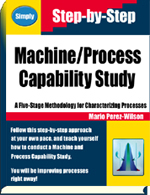Definitions: Process, Capability
Definition of Machine/Process Capability Study
M/PCpS Teams, SME Coordinators
1st Stage: Process Delineation - Machine Definition
Dissecting the Machine into Functional Characteristics
Types of Data: Attribute and Variable
Scales of Measurement
Cause and Effect Diagrams, Brainstorming
Pareto Diagrams
2nd Stage: Metrology Characterization
Accuracy, Precision
Gauge Repeatability and Reprobucibility Studies
GR&R Short Method, GR&R Long Method
3rd Stage: Capability Determination - Machine Definition
Descriptive Statistics
Normal Distribution, Standard Normal Distribution
Machine and Process Potential, Cp
Machine and Process Capability, Cpk
Six Sigma
Short and Long Term Capability Studies
4th Stage: Optimization - Reducing Process Variability
Experimentation - An Iterative Process
Factors or Independent Variables
Levels, Treatment Combinations
Factorials Designs, 2k Full Factorial Designs
Multi-vari Analysis, Reducing Variation
Concentration Diagrams
5th Stage: Control - Preventive Control
Variable Control Charts
PosiTrol Plans, PosiTrol Logs
Standard Worksheets and Forms
More...
Duration: Typically 3 to 4 days.
|
 |













